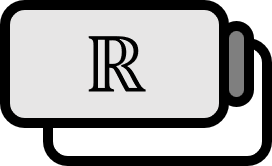Definition and Relationship of Extremum in Analysis and Differential Coefficients
Definition
Let $(X,d)$ be a metric space. If there exists a positive real number $\delta >0$ such that the function $f : X \rightarrow \mathbb{R}$ satisfies the condition below, then $f$ has a local maximum at point $p \in X$.
$$ \forall q\in X,\quad f(q)\le f(p)\ \mathrm{with}\ d(p,q)<\delta $$
Explanation
To put it in words:
If the direction of the inequality is reversed, it becomes the definition of a local minimum.
Let $(X,d)$ be a metric space. If there exists a positive real number $\delta >0$ such that the function $f : X \rightarrow \mathbb{R}$ satisfies the condition below, then $f$ has a local minimum at point $p \in X$.
$$ \forall q\in X,\quad f(q )\ge f(p)\ \mathrm{with}\ d(p,q)<\delta $$
The English terms local maximum/minimum and relative maximum/minimum both refer to local maxima/minima.
In high school mathematics, because limits, continuity, and differentiation are not defined rigorously, the place ‘where differentiation gives $0$ and the sign of the derivative changes from left to right’ was called a local maximum/minimum. In analysis, local maxima/minima are defined first, and if $f$ is differentiable, it can be proven that the derivative at a local maximum/minimum is $0$.
Theorem
Let’s assume that function $f$ is defined in the interval $[a,b]$. If $f$ has a local maximum at $x\in (a,b)$ and the derivative $f^{\prime}(x)$ exists at $x$, then $f^{\prime}(x)=0$ holds.
NOTE: Pay attention that the converse is not true. In other words, $f^{\prime}(x)=0$ does not guarantee that $x$ is a local maximum or minimum.
Proof
The method of proof is the same in the case of a local minimum.
Assuming $f$ has a local maximum at $x$, we can select a positive number $\delta$ as follows.
$$ a<x-\delta < x <x+\delta <b $$
Let’s consider dividing into points smaller and larger than $x$ based on $x$.
Case 1.
Let’s say $x-\delta < t < x$. Then, the following holds.
$$ \frac{f(t)-f(x)}{t-x} \ge 0 $$
Since $f(x)$ is a local maximum, taking the limit as $t\rightarrow x$ does not change the sign. Therefore, by the definition of derivative, the following holds.
$$ \begin{equation} f^{\prime}(x)=\lim \limits_{t\rightarrow x} \frac{f(t)-f(x)}{t-x} \ge 0 \end{equation} $$
Case 2.
Let’s say $x<t<x-\delta$. Then, the following holds.
$$ \frac{f(t)-f(x)}{t-x} \le 0 $$
For the same reason as Case 1., the following equation holds.
$$ \begin{equation} f^{\prime}(x)=\lim \limits_{t\rightarrow x} \frac{f(t)-f(x)}{t-x} \le 0 \end{equation} $$
$f^{\prime}(x)$ must satisfy both $(1)$ and $(2)$, thus we get the following.
$$ f^{\prime}(x)=0 $$
■
